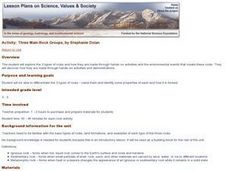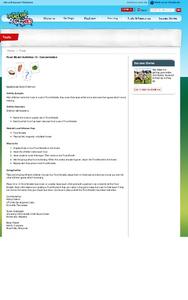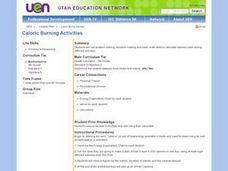Curated OER
Five Kingdoms of Living Things
Fifth graders are introduced to the classification system used in Science. In groups, they explain the characteristics of each of the five kingdoms. After watching a video, they review the life processes of each kingdom and complete a...
Curated OER
Three Main Rock Groups
Students are introduced to igneous, sedimentary and metamorphic rocks. They use foods to demonstrate the basic formation of each type of rock, read books about rock formation and view related videos.
Curated OER
Food Poisoning
Students study the bacteria that cause food poisoning using a written resource. They complete a research worksheet entitled, "America's Most Wanted." Next, they create a short skit about the causes, symptoms, prevention, and other...
Curated OER
Food: Discussion questions
In this discussion about food worksheet, students participate in an ask and answer session about food.
Curated OER
Completing Groups of Nouns
In this nouns instructional activity, 2nd graders choose a word from a word pool at the top of the instructional activity that will correctly complete a word group, 5 groups total.
Kentucky School for the Deaf
Levels of Organization within an Ecosystem
From tiny organisms to entire biomes, young scientists examine the interdependent relationships tying all living and non-living things together with this collection of ecology resources.
Science Matters
Crawly Composters
Get your hands dirty with an interactive lesson that showcases the process of decomposing and returning nutrients back into the soil. After building a compost pile, pupils regularly observe the ways worms help with changes to the soil...
Science Matters
That’s An Otter Story
Young scientists discover how sea otters' habitats have changed due to human impact. Through conversation, video observation, and story reading, scholars identify how human interactions change a specific ecosystem in both positive and...
Curated OER
Insects A-Z!
Alphabet insects! Who has ever heard of such a thing? Get ready because your class is going to research insects that start with a specific letter of the alphabet. In small groups, they'll use the Internet and reference texts to locate...
Science Matters
Ecosystem Pre-Assessment
Test scholars' knowledge of ecosystems with a 20-question pre-assessment. Assessment challenges learners to answer multiple choice questions, read diagrams, and complete charts.
Curated OER
Investigating What Makes Fruit Go Brown
Is there anything that can be done to slow the browning of fruit once it has been cut? High schoolers determine the answer through five different investigations involving apples, potatoes, and chemical reactions. After each experiment,...
Food a Fact of Life
Creative Crumbles
Class cooks practice the rubbing technique and the preparation of a range of bases to produce an apple and sultana or herby veggie crumble.
Food a Fact of Life
Soup-er!
Is there anything better than hot soup on a cold day? Kids prepare either vegetable chowder or minestrone soup in an activity that features the use of the stove top.
University of Georgia
Heating and Cooling of Land Forms
Compare heating and cooling rates of different land forms. A lab activity has groups collect data on the rate of heating and cooling of soil, grass, saltwater, fresh water, and sand. An analysis of the rates shows how the different land...
University of Georgia
Land Biomes Project
Challenge scholars to research a biome and create a presentation for the producers of Survivor to choose their ecosystem for the next season's show. The materials include outlines, worksheets, and grading rubrics for individuals as well...
Curated OER
Rainbow Electrophoresis Lab
Students are introduced to the principles of gel electrophoresis. They practice loading gels and pipetting. In this laboratory activity, food color is separated into constituent pigments. The lab can be run with standard electrophoresis...
Curated OER
Ocean Exploration
Students explore whales. In this animal adaptation and whale instructional activity, students access prior knowledge about whales from previous lessons, then use background knowledge to predict the eating strategies of a baleen whale and...
Curated OER
Biological and Agricultural Engineering
Eighth graders explore mathematics by conducting a series of investigations using a colorimeter. In this math lesson, 8th graders explain the purpose of food irradiation. They collect data and graph them.
Curated OER
Concentration
Students recognize sets of food pictures. In this food concentration lesson, students match food names and models. Students who name the most correctly win the game.
Curated OER
National Priorities for Hunger
In this national priorities for hunger worksheet, students assess the need in their community for food assistance, decide what needs to be done, rank the options, and determine a method for evaluating programs. This page has many...
Curated OER
Animals of the Fire Ice
Students examine ocean life by identifying methane hydrates. In this ocean life lesson, students research organisms that live in the coldest, deepest parts of the ocean and live off methane hydrates. Students create a group...
Curated OER
You Are What You Eat: Lessons from Alice Waters
Students view the AMERICAN MASTERS episode titled ALICE WATERS AND HER DELICIOUS REVOLUTION. They examine their own eating habits and determine how they can eat food that is both healthier and tastier. Through Guided Reading strategies,...
Curated OER
Our Friends or Foes
For this living organisms worksheet, 6th graders choose the multiple choice answer to 10 questions. Students then read and answer 10 statements as true or false and fill in the blanks to 5 statements.
Curated OER
Caloric Burning Activities
Fourth graders use problem solving, decision making and basic math skills to calculate calories used during different activities. They determine the relation between food intake and activity. Students also figure out the activity,...

























